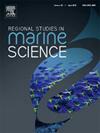Great baleen whales, great services
IF 2.1
4区 环境科学与生态学
Q3 ECOLOGY
引用次数: 0
Abstract
Over centuries, the human-whale interactions has evolved from perceiving them as monsters to recognition of whales as vital contributors, particularly for coastal communities. Great baleen whales play a crucial role in connecting the oceans through their migrations, facilitating a flow of nature's benefits to humans. Ecosystem services, encompassing tourism, education, and religious practices, offer returns. In addition, whales stimulate primary productivity, maintain biodiversity, and fertilize oceans with nutrient-rich excretions. Moreover, through their direct/indirect carbon fixation and sequestration, whales can be viewed as mitigators of climate change. Species of the family Balaenopteridae are distributed across different latitudes and oceans. Mapping tool serves as an effective method for characterizing the actual benefits that ecosystems provide to society, allowing the identification of priority areas for conservation. This study synthesized, mapped and verified the presence of “hotspots” of services provided by Balaenoptera musculus, Balaenoptera physalus, Balaenoptera borealis, Balaenoptera acutorostrata, and Megaptera novaeangliae, revealing provisioning, cultural, regulatory, and maintenance services through a systematic literature review. Recognizing the complex spatial dynamics of these roles as crucial socioeconomically and culturally, it is imperative to integrate them into spatial and management planning. This inclusive approach brings a pluralistic perspective and clarifies the provision of ecosystem services by area, ultimately ensuring more efficient marine management and the sustainability of marine ecosystems.
伟大的须鲸,伟大的服务
几个世纪以来,人类与鲸鱼的互动已经从把鲸鱼视为怪物发展到承认鲸鱼是重要的贡献者,尤其是对沿海社区而言。大须鲸通过迁徙在连接海洋方面发挥着至关重要的作用,促进了大自然的惠益流向人类。包括旅游、教育和宗教活动在内的生态系统服务提供了回报。此外,鲸鱼还能刺激初级生产力,维持生物多样性,并用富含营养的排泄物肥沃海洋。此外,通过直接/间接的碳固定和碳封存,鲸鱼可被视为气候变化的减缓者。鲸科物种分布在不同的纬度和海洋。绘图工具是描述生态系统为社会带来的实际利益的有效方法,可以确定优先保护区域。本研究通过系统的文献综述,综合、绘制并验证了麝香鲸、鲈形目蝠鲼、北海蝠鲼、尖吻蝠鲼和巨蝠鲼提供服务的 "热点",揭示了提供、文化、调节和维护服务。由于认识到这些角色在社会经济和文化方面至关重要的复杂空间动态,将其纳入空间和管理规划势在必行。这种包容性方法带来了多元化视角,明确了各区域提供的生态系统服务,最终确保了更高效的海洋管理和海洋生态系统的可持续性。
本文章由计算机程序翻译,如有差异,请以英文原文为准。
求助全文
约1分钟内获得全文
求助全文
来源期刊

Regional Studies in Marine Science
Agricultural and Biological Sciences-Ecology, Evolution, Behavior and Systematics
CiteScore
3.90
自引率
4.80%
发文量
336
审稿时长
69 days
期刊介绍:
REGIONAL STUDIES IN MARINE SCIENCE will publish scientifically sound papers on regional aspects of maritime and marine resources in estuaries, coastal zones, continental shelf, the seas and oceans.
 求助内容:
求助内容: 应助结果提醒方式:
应助结果提醒方式:


